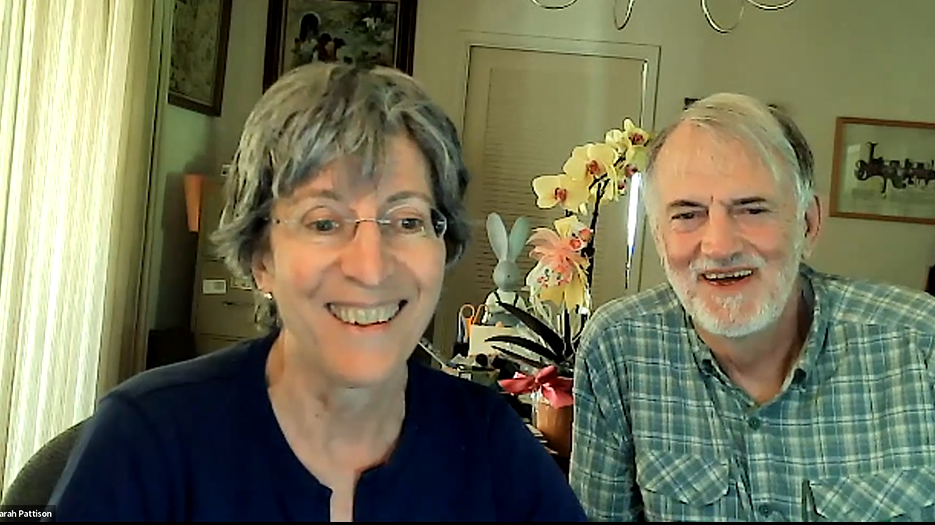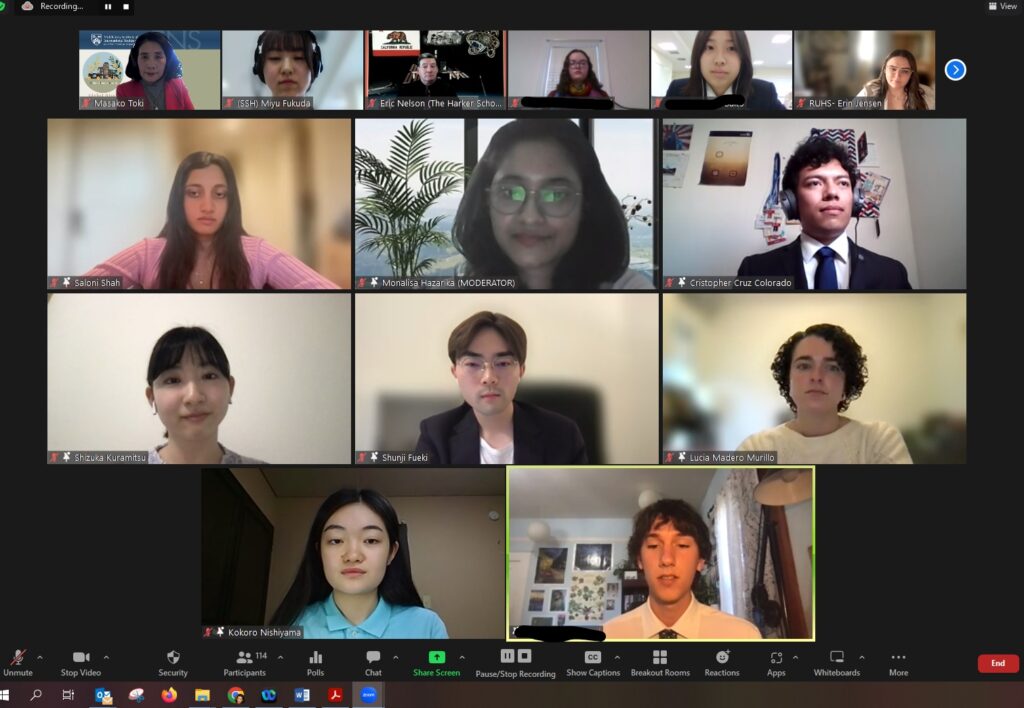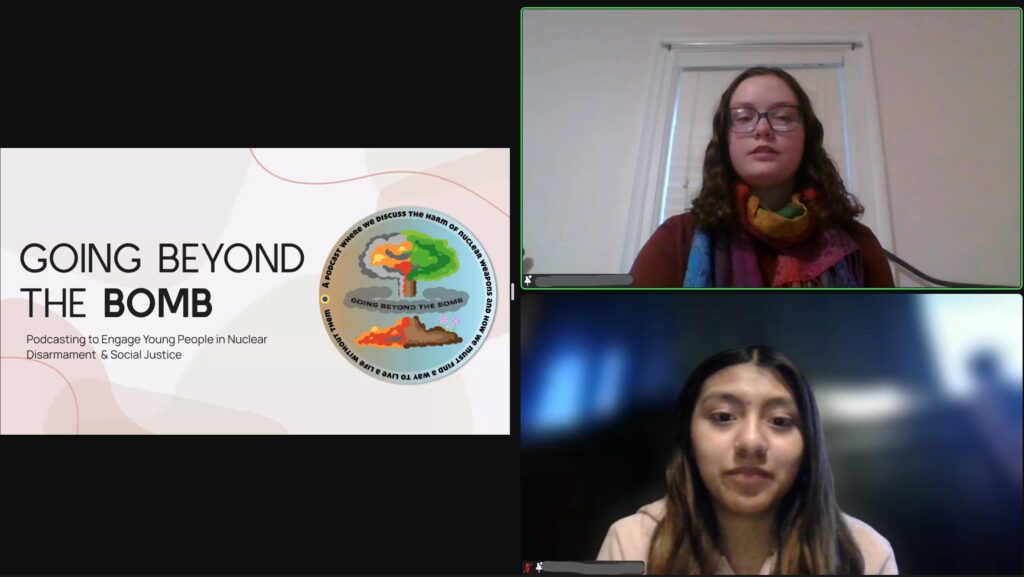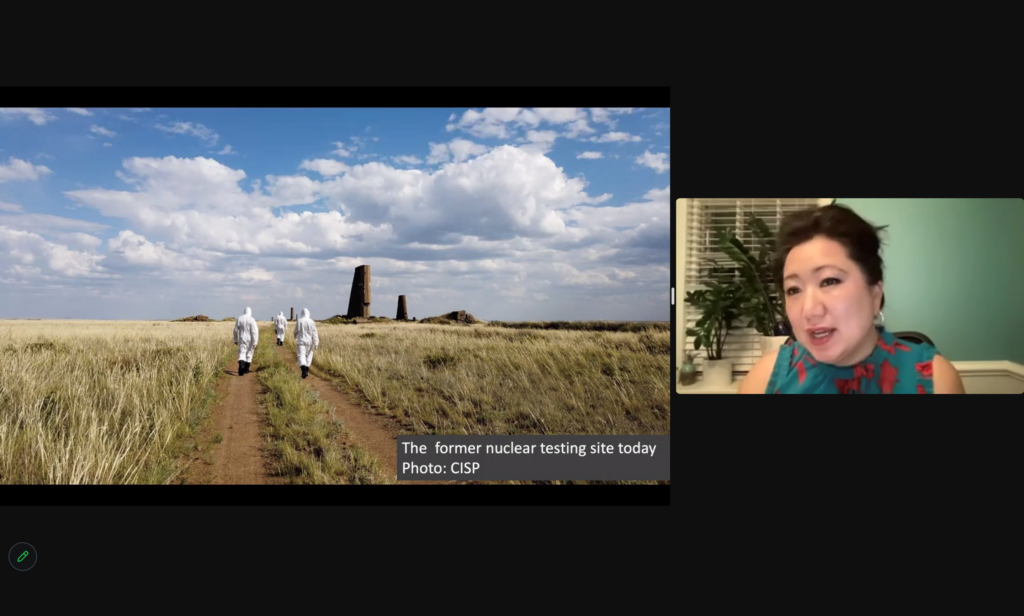May 11, 2023
Masako Toki
On April 15, 2023, over 120 high school students and teachers gathered online for the Critical Issues Forum Spring Conference. The topic of this year’s Critical Issues Forum (CIF) Spring Conference was “Bringing Intersectional Approaches to Youth Education for Nuclear Disarmament and Nonproliferation.”
As this year’s topic indicates, the challenge of nuclear weapons cannot be separated from other global and social challenges because the threat of nuclear weapons is multifaceted. We have learned how important international cooperation is in order to solve global challenges through the global pandemic experience. We have become more aware of the interconnectedness of seemingly different problems around the world. Therefore, it is important to find solutions to nuclear challenges by taking intersectional approaches.
The Critical Issues Forum (CIF) is a unique program facilitated by the James Martin Center for Nonproliferation Studies (CNS) at the Middlebury Institute of International Studies at Monterey (MIIS) of project-based education. CIF is designed to promote awareness of nonproliferation and disarmament issues and develop critical thinking and cross-cultural communication skills among high school students from around the world. Each year, participating high schools complete semester-long projects that pertain to the topic and present final projects at the CIF Spring Conference.
Although the conference was convened in a virtual format this year, CIF activities are gradually transitioning back to more in-person activities. All the virtual events held during the pandemic over the past three years have served as an impetus to enhance more active engagement in future disarmament education activities for high school students.
This year, twelve different high schools joined the online conference, five from Japan and seven from the United States.
Opening Session
CIF Project Manager, Masako Toki, began the conference with an opening statement that congratulated and expressed appreciation for all the participants in attendance. Next,
Mr. and Mrs. Tom and Sarah Pattison, supporters of CNS education activities for well over a decade, warmly encouraged participating students to continue to study this important subject.
CIF Students and Alumni Panel Discussion
The first item on the conference agenda after the opening session was a student panel discussion that was led by student representatives from this year’s participants in attendance. The discussion was moderated by Ms. Monalisa Hazarika, a member of the #Leaders4Tomorrow of the United Nations Office for Disarmament Affairs’ (UNODA) #Youth4Disarmament initiative. Since both Yuth4Disarmament and CIF promote disarmament education for young people, the collaboration between these two projects exemplifies effective partnership for disarmament education.
Monalisa introduced each panelist one by one starting with current CIF students first (Dawson Brej from Monterey High School, Luke Callaghan from Choate Rosemary Hall, Hiyori Kobayashi from Nagasaki Higashi Senior High School, Sakura Mitsuzuka from Kansai Soka Senior High School, Sarah Zdancewic from Masterman School). Each student shared their perspectives on the significance of nuclear disarmament, their group project, and what they thought was most important in the discussion of youth involvement in nuclear issues today. Students also shared challenges faced during the project, future goals, and aspirations.
A CIF Alumni Panel Discussion followed, where program alumni shared their experiences working on the project and where they are today. Panelists included Lucia Madero Murillo (2015), Shizuka Kuramitsu (2015), Shunji Fueki (2016), Cris Cruz (2017), Kokoro Nishiyama (2017) and Saloni Shah (2018~2021). Each panelist spoke about their current work or academic studies and how CIF helped them get there. Questions from the current CIF students to CIF alumni panelists led discussions to deeper dialogues on the current war in Ukraine, the role of civil society, and young people for nuclear disarmament.
CIF Students Live Presentations
Each participating high school created a final project based on this year’s topic, and submitted a video or presentation that all CIF participants have access to. Final projects can be viewed by visiting the conference booklet on the CIF website.
This year, the featured student live presentation was from Rock University High School students, Claire Dieckhoff and Ana Paula Dominguez Antonio called Going Beyond the Bomb. They shared research findings and their final project that was a podcast entitled, The Intersectionality of Nuclear Weapons and Marginalized Communities. Claire and Ana went into detail about the development of their project and everyone who made it possible. They talked about how their podcast featured different student guests on each episode. Their episode focused on marginalized communities and highlighted the communities of the Navajo Nation, the Western Shoshone People and the indigenous Marshallese People. They described how these communities have been impacted by nearby nuclear testing. Then they concluded by talking about effective ways to get youth involved with disarmament activities.
Keynote Speech
One of the highlights of the conference was the keynote speech by Dr. Togzhan Kassenova titled The Continued Legacy of Soviet Nuclear Tests in Kazakhstan. In her sobering, and very powerful keynote speech she discussed the disparaging effect of nuclear testing in her country of origin, Kazakhstan, and resilience of victims of the testing. She focused on the health issues that were caused by nuclear testing including deformity and stunted growth. She gave an empathetic view to the victims and increased the students’ awareness of the perils and consequences of nuclear testing.
Students had a number of questions for Dr. Kassenova during the Q&A part of the keynote speech that ranged from career advice to specific questions on nuclear testing.
When students asked for advice when pursuing a career in the field of nuclear disarmament Dr. Kassenova told the students that the field of disarmament is not easy, but urged the students to pursue this rewarding field that works to provide a better future.
Another question asked was about how the DNA irregularities caused by radiation are passed down genetically. Dr. Kassenova described how the radiation that victims are exposed to is passed down genetically from generation to generation.
In addition, one student inquired about the kind of support the general public can provide for those who suffer from the effects of nuclear testing. Dr. Kassenova elaborated on socio-economic support for those who have severe health problems. She noted that such monetary support may not fully cure victims’ deformity and disease caused by testing, but help them to receive appropriate medical treatment.
Dr. Kassenova also mentioned the significance of the Treaty on the Prohibition of Nuclear Weapons as this treaty includes the provision of victim assistance.
Breakout Session
CIF students had a chance to experience intercultural activities and develop friendships during the breakout session that followed the keynote speech. Students were organized into break out groups with students from other high schools from different cities and countries. An intercultural and nonproliferation trivia created by CNS Education program Graduate Research Assistants facilitated active and enjoyable small group discussions. After trivia, CIF students had a chance to share and exchange their views on nuclear disarmament, the role of youth, their CIF experience, and their future goals and dreams.
Conclusion
To conclude the conference each school received a certificate of completion from CNS. Each participating student will also receive a certificate from CNS. In addition, CIF students were each designated as a Youth Communicator for a World without Nuclear Weapons by the Japanese Ministry of Foreign Affairs. CIF students were first designated as first Youth Communicators outside of Japan in 2016, and have been designated every year since upon program completion.
As demonstrated by Japanese Prime Minister Fumio Kishida who established the “Youth Leader Fund for a world without nuclear weapons” earlier this year, Japan emphasizes the importance of youth education for nuclear disarmament as the only country that has experienced wartime nuclear devastation. In this regard, CIF is honored that participating students are designated as Youth Communicators by the Japanese government.
Furthermore, the CIF team is delighted that the partnership with the Bread Loaf Teacher Network will continue. This year, CIF welcomed three US high schools, one of which is Julia R. Masterman Laboratory and Demonstration School. The CIF project at this school is led by a teacher in the Bread Loaf Teacher Network. The collaboration with the Bread Loaf Teacher Network brings more diverse schools to the CIF project, and expands disarmament and nonproliferation education to a wider audience.
This conference took place in the midst of heightening tensions on nuclear weapons. The challenges surrounding nuclear weapons seem to be insurmountable. However, this is exactly why we continue to exert ourselves in promoting disarmament and nonproliferation education for young people and for a better future. The Critical Issues Forum aims to empower students to grow into individuals who can contribute to peace and security, disarmament, and nonproliferation through disarmament and nonproliferation education.
We firmly believe that high school students are at the best age to start learning about nuclear weapons problems. We will continue to promote disarmament and nonproliferation education to empower and engage young generations.
This year’s Critical Issues Forum project is made possible by funding from the Tom and Sarah Pattison Fund, the SAGA Foundation, the Kathryn Wasserman Davis Collaborative in Conflict Transformation Fund, Mr. Gregg Wolpert, and many generous private donors.
Participating Schools
United States
- Choate Rosemary Hall, Wallingford, CT
- The Harker School, San Jose, CA
- Julia R. Masterman Laboratory and Demonstration School, Philadelphia, PA
- Monterey High School, Monterey, CA
- Rock University High School, Janesville, WI
- Westridge School, Pasadena, CA
- University School of Nashville, Nashville, TN
Japan
- Hiroshima Jogakuin Senior High School, Hiroshima
- Kaisei Senior High School, Tokyo
- Kansai Soka Senior High School, Osaka
- Nagasaki Higashi High School, Nagasaki
- Soka Senior High School, Tokyo




